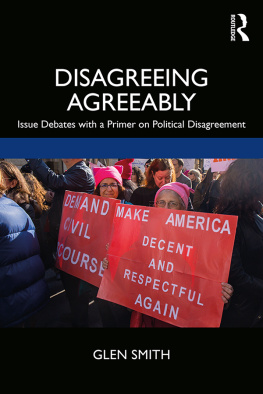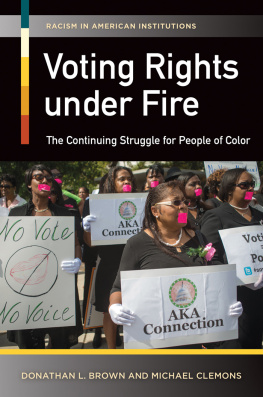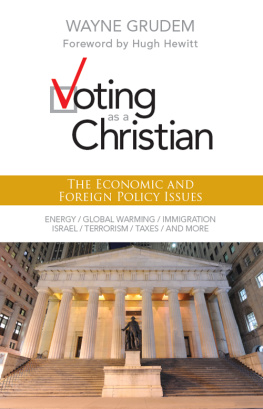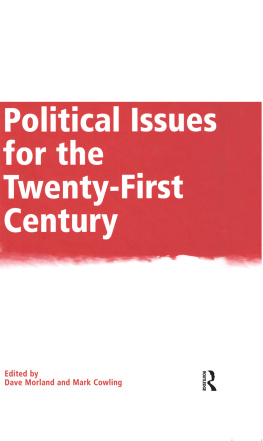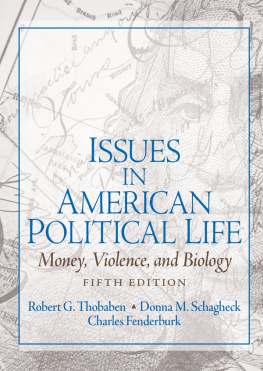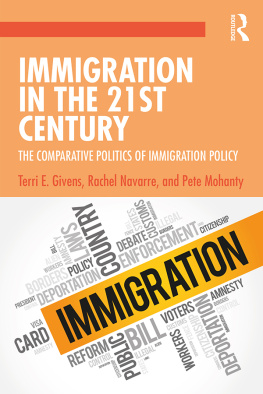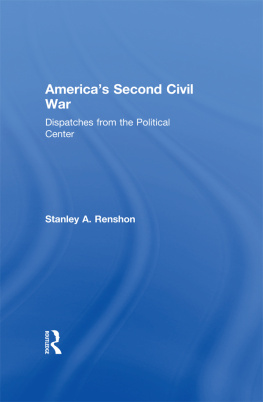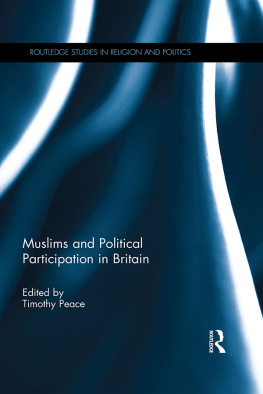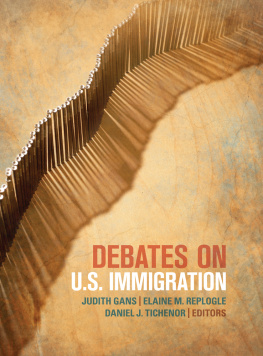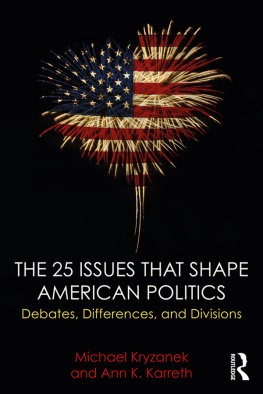DISAGREEING AGREEABLY
This book facilitates civil discussion of controversial political issues. Unique to this book is a section that explains how to discuss politics without feeling angry or hostile toward people who hold different beliefs. In addition, the book provides concise and accessible debates of contemporary policy issues including gun control, immigration, the Electoral College, voting, and affirmative action. For each topic, readers are shown that opposing arguments are based on values and concerns that are widely shared by most people regardless of their political leanings. Perfect for students, professors, and citizens alike, this book promotes civility without shying away from controversy.
Glen Smith is a professor of political science at the University of North Georgia. Although he teaches a variety of courses in American politics, Glen has spent most of his career teaching Introduction to American Government to students from all backgrounds and educational interests. Glens research focuses on the causes and consequences of political hostility, and he has written articles on this topic for political science journals including American Politics Research, Political Research Quarterly, and Public Opinion Quarterly. Summaries of his work have also been featured on political news websites such as Psypost.org and Newsweek.
Disagreeing Agreeably will get students to think about political disagreement in new ways, get them interested in talking with others about politics, and encourage them to get better educated about the issues they care about.
Philip Neisser, Dean of Business and Liberal Arts, SUNY Canton, USA
Glen Smith has written a highly readable text for students to better understand why polarization happens in the context of framing and civility. I highly recommend this engaging text that will help students make sense of major policy debates in American politics. This is an important book at an important time in our country.
Paul E. Lenze, Jr., Northern Arizona University, USA
First published 2020
by Routledge
52 Vanderbilt Avenue, New York, NY 10017
and by Routledge
2 Park Square, Milton Park, Abingdon, Oxon OX14 4RN
Routledge is an imprint of the Taylor & Francis Group, an informa business
2020 Taylor & Francis
The right of Glen Smith to be identified as author of this work has been asserted by him in accordance with sections 77 and 78 of the Copyright, Designs and Patents Act 1988.
All rights reserved. No part of this book may be reprinted or reproduced or utilised in any form or by any electronic, mechanical, or other means, now known or hereafter invented, including photocopying and recording, or in any information storage or retrieval system, without permission in writing from the publishers.
Trademark notice: Product or corporate names may be trademarks or registered trademarks, and are used only for identification and explanation without intent to infringe.
British Library Cataloguing in Publication Data
A catalogue record for this book is available from the British Library
Library of Congress Cataloging-in-Publication Data
Names: Smith, Glen (Professor of political science), author.
Title: Disagreeing agreeably : issue debates with a primer on political disagreement / Glen Smith.
Description: New York : Routledge, [2019] | Includes bibliographical references. |
Identifiers: LCCN 2019008709 (print) | LCCN 2019019403 (ebook) | ISBN 9781000019988 (Adobe Reader) | ISBN 9781000020090 (Mobipocket Unencrypted) | ISBN 9781000020205 (ePub3) | ISBN 9780367228262 (hardback) | ISBN 9780367228279 (pbk.) | ISBN 9780429277054 (ebook)
Subjects: LCSH: Political culture--United States. | Communication in politics--United States. | Polarization (Social sciences)--Political aspects--United States.
Classification: LCC JK1726 (ebook) | LCC JK1726 .S644 2019 (print) | DDC 320.97301/4--dc23
LC record available at https://lccn.loc.gov/2019008709
ISBN: 978-0-367-22826-2 (hbk)
ISBN: 978-0-367-22827-9 (pbk)
ISBN: 978-0-429-27705-4 (ebk)
Writing this book was a long and fulfilling process, which I never would have accomplished alone. There are so many people that I would like to thank. My wife Joy provided me the constant love and support I needed to write this book. Words cannot express how grateful I am that she inexplicably chose me. My son Jackson constantly inspires me to make the world a better place. My mother Helen spent all those days watching Jackson while I worked. My father Ray, and my sister Brooke, helped me think through some of the important questions in this book. Going further back in time, I would like to thank John Gaddy for recognizing the intellectual curiosity in me that I didn't know was there. I am also grateful to Phil Neisser, who inspired me to become a professor and taught me that political disagreement was something to be celebrated. This book was made possible by the Presidential Semester Scholar Award, which provided funding for my sabbatical. As such, I would like to thank the University of North Georgia for its continued support of my scholarly endeavors. Finally, I want to thank a few of my friends and colleagues that have provided me encouragement and emotional support over the last few years. Thank you Joe Huseby, Paul Lenze, John and Katie Nickerson, Jeff Rosky, Kathleen Woodward, and anyone else I may have accidentally left out.
Since the turn of the 21st century, there has been an alarming rise in anger and hostility in American politics. Political commentators in the news media, as well as prominent politicians, have expressed a great deal of concern that the members of the two political parties seem to increasingly dislike each other. A recent report by the Pew Research Center provides numerous examples illustrating a stunning increase in political hostility. For example, More than half of Democrats (55%) say the Republican Party makes them afraid, while 49% of Republicans say the same about the Democratic Party (Pew Research Center 2016). The most widespread complaint about the other party is that they are closed-minded. In 2016, 70 percent of Democrats said they believed Republicans were more closed-minded than most Americans, while a majority (52%) of Republicans said the same about Democrats (Pew Research Center 2016). There is additional research showing that partisans feel increasing animosity toward people in the opposing party (Iyengar, Sood, and Lelkes 2012; Iyengar and Westwood 2015).
The increasing political hostility between opposing partisans has important consequences for how we get along with other people. Political differences can result in the loss of valuable friendships and even estrangement from family members. For example, one survey found that roughly a quarter (26%) of those using social media have hidden, blocked, defriended or stopped following someone because of a political disagreement (Pew Research Center 2014). For some, political differences have even strained relationships with family members and romantic partners (Pesce 2016; McCarthy 2016; Holmes 2017). During the 2016 presidential campaign, a Pew Research Center survey found that 41 percent of couplesthat supported opposing candidatessaid they had argued about politics (Holmes 2017). Perhaps to avoid future conflict, partisans are ruling out members of the opposing Party as potential romantic partners (Huber and Malhotra. 2017). Additionally, parents are increasingly likely to say that they would be uncomfortable with their child marrying someone in the opposing political party (Iyengar, Sood, and Lelkes 2012). In short, the inability to rationally and productively deal with political disagreements can have important consequences for peoples personal relationships.

